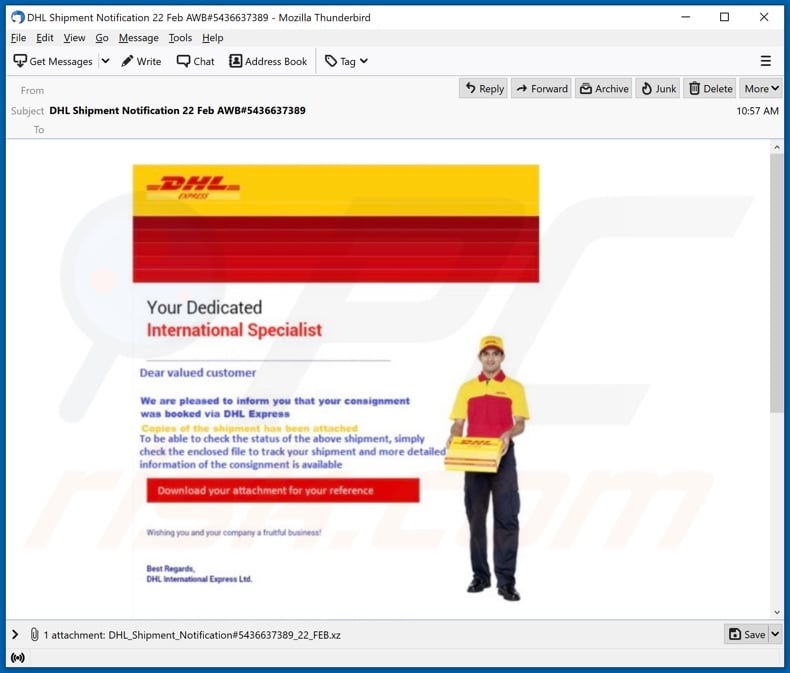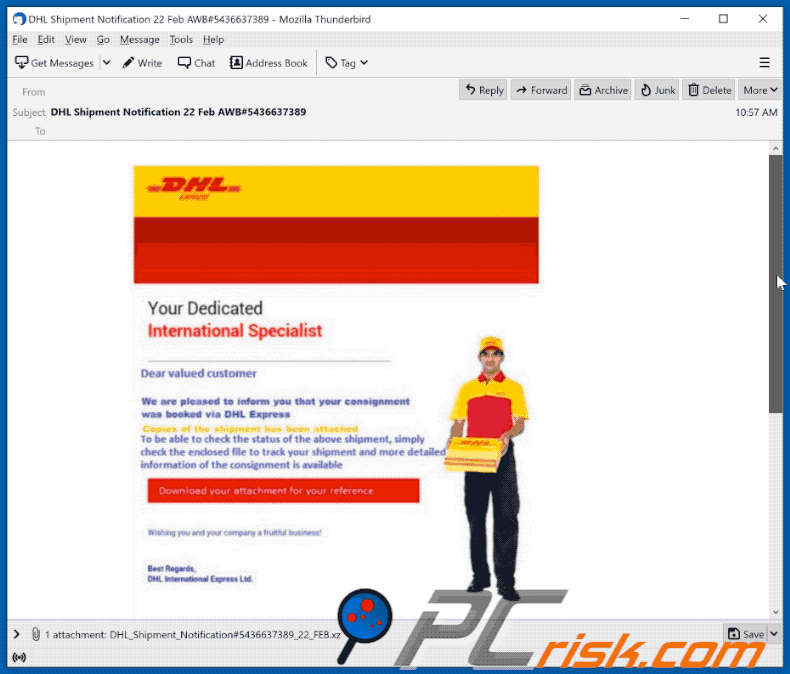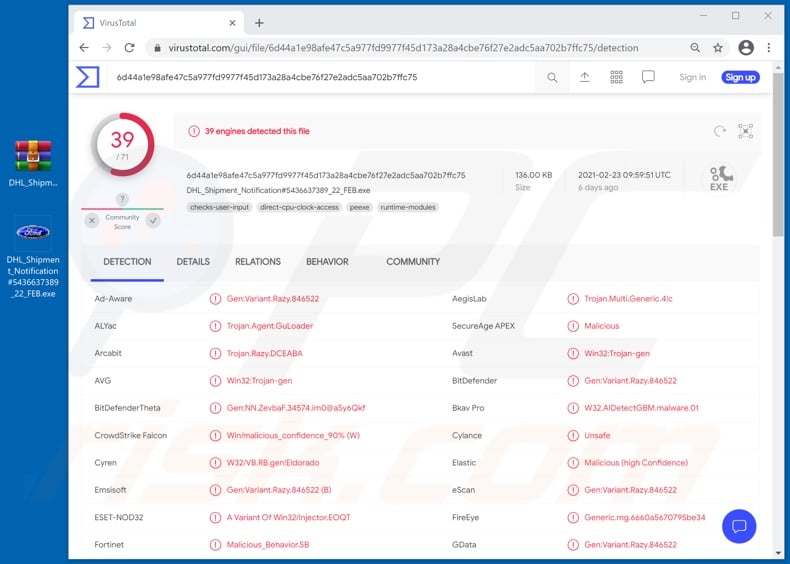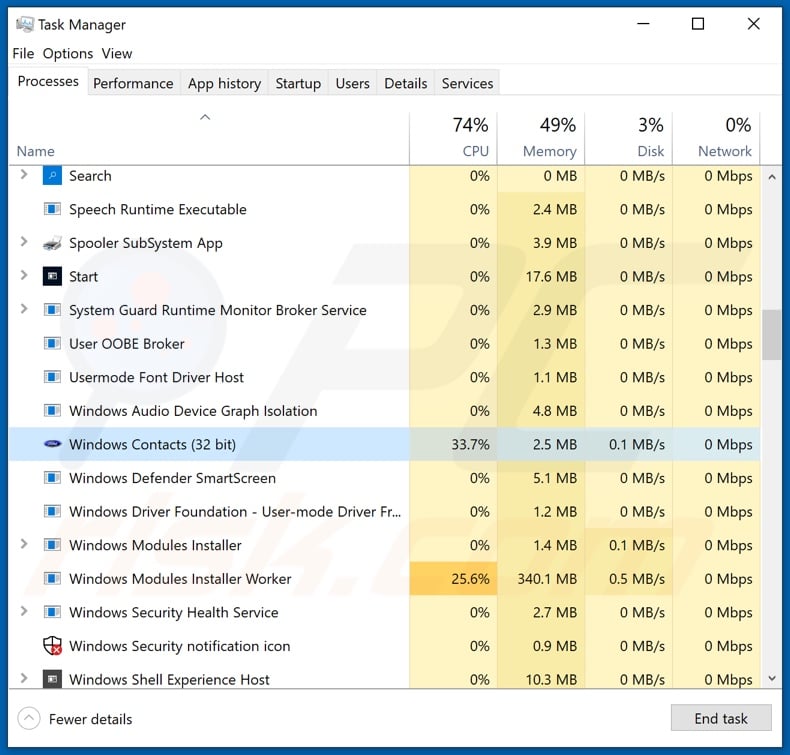Do not trust "Consignment was booked via DHL Express" scam emails
Phishing/ScamAlso Known As: Consignment Was Booked Via DHL Express spam
Get free scan and check if your device is infected.
Remove it nowTo use full-featured product, you have to purchase a license for Combo Cleaner. Seven days free trial available. Combo Cleaner is owned and operated by RCS LT, the parent company of PCRisk.com.
What is the "Consignment was booked via DHL Express" scam email?
"Consignment was booked via DHL Express email virus" refers to a malware-spreading spam campaign. This term defines a mass-scale operation during which thousands of deceptive/scam emails are sent. These messages are presented as arranged shipment notifications from DHL International, a legitimate courier, package delivery, and express mail service.
Note that the "Consignment was booked via DHL Express" scam emails are in no way associated with the genuine DHL International GmbH. The goal of this spam campaign is to infect recipients' devices with the GuLoader malware.
Examples of this spam email have also been seen spreading FormBook malware.

The "Consignment was booked via DHL Express" scam messages (subject/title "DHL Shipment Notification 22 Feb AWB#5436637389" may vary) inform recipients that their shipments have been arranged. Detailed information concerning the booked consignments are attached to the emails.
Additionally, the attachment supposedly contains data that will allow recipients to track the shipment. The attached documents will need to be provided upon the fake consignment's delivery, and thus recipients are warned not to lose them. Instead of containing shipment-related information, however, the infectious files initiate download/install of GuLoader once opened.
GuLoader malware is designed to cause chain infections - it can download/install additional malicious programs. Malware of this type can infect systems with a wide variety of rogue software. To elaborate, GuLoader can potentially infect devices with trojans, ransomware, cryptocurrency miners, and other malware.
Trojans can have varied capabilities such as enabling remote access and control over the compromised machine, spying (e.g., recording keystrokes and/or audio/video), exfiltrating information and content from infected systems, extracting data from browsers and other installed applications, etc.
Ransomware operates by encrypting data and/or locking the device for ransom purposes. Cryptominers use system resources to generate cryptocurrency, possibly to the point of permanent system failure.
To summarize, by trusting the "Consignment was booked via DHL Express" scam emails, users can experience system infections, severe privacy issues, financial losses, and identity theft. If it is suspected/known that GuLoader (or other malware) has already infected the device, use anti-virus software to remove it immediately.
| Name | Consignment Was Booked Via DHL Express spam |
| Threat Type | Trojan, password-stealing virus, banking malware, spyware. |
| Hoax | Scam emails are presented as notifications concerning recipients' shipments being booked. |
| Disguise | Notifications from DHL |
| Attachment(s) | DHL_Shipment_Notification#5436637389_22_FEB.exe (filename may vary) |
| Detection Names | Avast (Win32:Trojan-gen), BitDefender (Gen:Variant.Razy.846522), ESET-NOD32 (A Variant Of Win32/Injector.EOQT), Kaspersky (UDS:DangerousObject.Multi.Generic), Microsoft (Trojan:Win32/GuLoader.PB!MTB), Full List Of Detections (VirusTotal) |
| Symptoms | Trojans are designed to stealthily infiltrate the victim's computer and remain silent, and thus no particular symptoms are clearly visible on an infected machine. |
| Payload | GuLoader, FormBook |
| Rogue Process Name | Windows Contacts (process name may vary) |
| Distribution methods | Infected email attachments, malicious online advertisements, social engineering, software 'cracks'. |
| Damage | Stolen passwords and banking information, identity theft, the victim's computer added to a botnet. |
| Malware Removal (Windows) |
To eliminate possible malware infections, scan your computer with legitimate antivirus software. Our security researchers recommend using Combo Cleaner. Download Combo CleanerTo use full-featured product, you have to purchase a license for Combo Cleaner. 7 days free trial available. Combo Cleaner is owned and operated by RCS LT, the parent company of PCRisk.com. |
"C.N. FREIGHT & SHIPPING Email Virus", "Customer Complaint Report", and "Here's your PayPal invoice" are some examples of malware-proliferating spam campaigns. Disguising the scam emails as mail from legitimate entities is common, however, the messages may be presented as "urgent", "important", "priority", and similar without mentioning genuine companies.
Regardless of what these emails claim, promise, offer, request, or demand, the purpose remains the same: to generate revenue for the scammers/cyber criminals behind them. As well as spreading malicious programs, deceptive messages are also used for phishing and other scams.
Due to the widespread nature of spam mail, exercise caution with incoming emails.
How did "Consignment was booked via DHL Express email virus" infect my computer?
Phishing emails that are used to deliver malware generally contain a download link for a malicious file or attachment. Typically, cyber criminals attempt to trick recipients into opening a PDF or Microsoft Office document, JavaScript file, an executable file (.exe), ZIP, RAR, or other archive file that is designed to install specific malicious software.
Note that malicious MS Office documents can install malware only when users enable editing/content (macros commands). If the documents are opened with MS Office versions prior to 2010, however, the documents install malicious software automatically, since these older versions do not include "Protected View" mode.
How to avoid installation of malware
To avoid malware spread via spam mail, you are strongly advised against opening suspicious or irrelevant emails, especially those with any attachments or links present within them.
Additionally, use Microsoft Office versions released after 2010. Malicious programs also proliferate through untrusted download channels (e.g. unofficial and free file-hosting sites, Peer-to-Peer sharing networks and other third party downloaders), illegal software activation ("cracking") tools, and fake updaters.
Therefore, only download from official/verified sources and activate and update software with tools/functions provided by legitimate developers.
To ensure device integrity and user privacy, have a reputable anti-virus/anti-spyware suite installed and kept updated. Furthermore, use these programs to run regular system scans and to remove detected/potential threats.
If you have already opened a "Consignment was booked via DHL Express email virus" attachment, we recommend running a scan with Combo Cleaner Antivirus for Windows to automatically eliminate infiltrated malware.
Text presented in the "Consignment was booked via DHL Express" scam email message:
Subject: DHL Shipment Notification 22 Feb AWB#5436637389
DHL Express
Your Dedicated International Specialist
Dear valued customer
We are pleased to inform you that your consignment was booked via DHL Express
Copies of the shipment has been attached
To be able to check the status of the above shipment, simply check the enclosed file to track your shipment and more detailed information of the consignment is available
Download your attachment for your reference
Wishing you and your company a fruitful business!
Best Regards,
DHL International Express Lt.
Keep the downloaded documents safe because, we will need you to provide them for confirmation before delivering your parcel.
Appearance of the "Consignment was booked via DHL Express" scam email (GIF):

Screenshot of VirusTotal detections of the attachment distributed via "Consignment was booked via DHL Express" spam campaign ("DHL_Shipment_Notification#5436637389_22_FEB.exe"):

Screenshot of the malicious executable process in Windows Task Manager ("Windows Contacts"):

Instant automatic malware removal:
Manual threat removal might be a lengthy and complicated process that requires advanced IT skills. Combo Cleaner is a professional automatic malware removal tool that is recommended to get rid of malware. Download it by clicking the button below:
DOWNLOAD Combo CleanerBy downloading any software listed on this website you agree to our Privacy Policy and Terms of Use. To use full-featured product, you have to purchase a license for Combo Cleaner. 7 days free trial available. Combo Cleaner is owned and operated by RCS LT, the parent company of PCRisk.com.
Quick menu:
- What is Consignment Was Booked Via DHL Express spam?
- Types of malicious emails.
- How to spot a malicious email?
- What to do if you fell for an email scam?
Types of malicious emails:
![]() Phishing Emails
Phishing Emails
Most commonly, cybercriminals use deceptive emails to trick Internet users into giving away their sensitive private information, for example, login information for various online services, email accounts, or online banking information.
Such attacks are called phishing. In a phishing attack, cybercriminals usually send an email message with some popular service logo (for example, Microsoft, DHL, Amazon, Netflix), create urgency (wrong shipping address, expired password, etc.), and place a link which they hope their potential victims will click on.
After clicking the link presented in such email message, victims are redirected to a fake website that looks identical or extremely similar to the original one. Victims are then asked to enter their password, credit card details, or some other information that gets stolen by cybercriminals.
![]() Emails with Malicious Attachments
Emails with Malicious Attachments
Another popular attack vector is email spam with malicious attachments that infect users' computers with malware. Malicious attachments usually carry trojans that are capable of stealing passwords, banking information, and other sensitive information.
In such attacks, cybercriminals' main goal is to trick their potential victims into opening an infected email attachment. To achieve this goal, email messages usually talk about recently received invoices, faxes, or voice messages.
If a potential victim falls for the lure and opens the attachment, their computers get infected, and cybercriminals can collect a lot of sensitive information.
While it's a more complicated method to steal personal information (spam filters and antivirus programs usually detect such attempts), if successful, cybercriminals can get a much wider array of data and can collect information for a long period of time.
![]() Sextortion Emails
Sextortion Emails
This is a type of phishing. In this case, users receive an email claiming that a cybercriminal could access the webcam of the potential victim and has a video recording of one's masturbation.
To get rid of the video, victims are asked to pay a ransom (usually using Bitcoin or another cryptocurrency). Nevertheless, all of these claims are false - users who receive such emails should ignore and delete them.
How to spot a malicious email?
While cyber criminals try to make their lure emails look trustworthy, here are some things that you should look for when trying to spot a phishing email:
- Check the sender's ("from") email address: Hover your mouse over the "from" address and check if it's legitimate. For example, if you received an email from Microsoft, be sure to check if the email address is @microsoft.com and not something suspicious like @m1crosoft.com, @microsfot.com, @account-security-noreply.com, etc.
- Check for generic greetings: If the greeting in the email is "Dear user", "Dear @youremail.com", "Dear valued customer", this should raise suspiciousness. Most commonly, companies call you by your name. Lack of this information could signal a phishing attempt.
- Check the links in the email: Hover your mouse over the link presented in the email, if the link that appears seems suspicious, don't click it. For example, if you received an email from Microsoft and the link in the email shows that it will go to firebasestorage.googleapis.com/v0... you shouldn't trust it. It's best not to click any links in the emails but to visit the company website that sent you the email in the first place.
- Don't blindly trust email attachments: Most commonly, legitimate companies will ask you to log in to their website and to view any documents there; if you received an email with an attachment, it's a good idea to scan it with an antivirus application. Infected email attachments are a common attack vector used by cybercriminals.
To minimise the risk of opening phishing and malicious emails we recommend using Combo Cleaner Antivirus for Windows.
Example of a spam email:

What to do if you fell for an email scam?
- If you clicked on a link in a phishing email and entered your password - be sure to change your password as soon as possible. Usually, cybercriminals collect stolen credentials and then sell them to other groups that use them for malicious purposes. If you change your password in a timely manner, there's a chance that criminals won't have enough time to do any damage.
- If you entered your credit card information - contact your bank as soon as possible and explain the situation. There's a good chance that you will need to cancel your compromised credit card and get a new one.
- If you see any signs of identity theft - you should immediately contact the Federal Trade Commission. This institution will collect information about your situation and create a personal recovery plan.
- If you opened a malicious attachment - your computer is probably infected, you should scan it with a reputable antivirus application. For this purpose, we recommend using Combo Cleaner Antivirus for Windows.
- Help other Internet users - report phishing emails to Anti-Phishing Working Group, FBI’s Internet Crime Complaint Center, National Fraud Information Center and U.S. Department of Justice.
Share:

Tomas Meskauskas
Expert security researcher, professional malware analyst
I am passionate about computer security and technology. I have an experience of over 10 years working in various companies related to computer technical issue solving and Internet security. I have been working as an author and editor for pcrisk.com since 2010. Follow me on Twitter and LinkedIn to stay informed about the latest online security threats.
PCrisk security portal is brought by a company RCS LT.
Joined forces of security researchers help educate computer users about the latest online security threats. More information about the company RCS LT.
Our malware removal guides are free. However, if you want to support us you can send us a donation.
DonatePCrisk security portal is brought by a company RCS LT.
Joined forces of security researchers help educate computer users about the latest online security threats. More information about the company RCS LT.
Our malware removal guides are free. However, if you want to support us you can send us a donation.
Donate
▼ Show Discussion